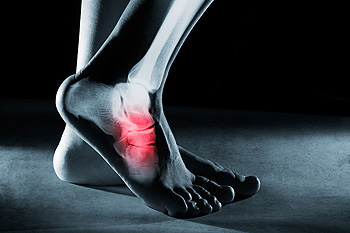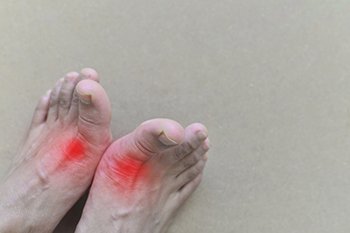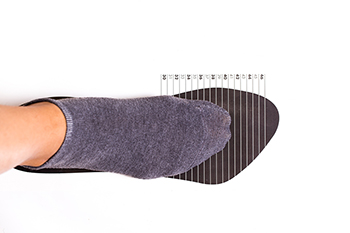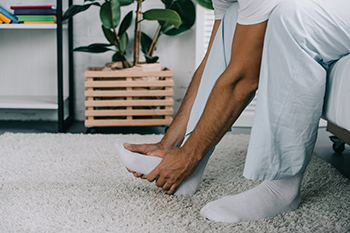June 2024
Definition and Causes of Foot Stress Fractures

A foot stress fracture is a small crack or severe bruising within a bone, often resulting from repetitive force or overuse rather than a single traumatic event. Common causes include high-impact sports, sudden increases in physical activity, and wearing inadequate footwear. Stress fractures frequently occur in the weight-bearing bones of the foot, such as the metatarsals. Symptoms include pain that worsens with activity and diminishes with rest, swelling, and tenderness at the fracture site. Recovery time for a foot stress fracture typically ranges from six to eight weeks, depending on the severity and adherence to treatment. Proper rest, wearing supportive footwear, and gradually returning to activities are essential for healing. In some cases, immobilization with a boot or crutches may be necessary. If your foot hurts, it is suggested that you visit a podiatrist who can accurately diagnose and treat stress fractures.
Stress fractures occur when there is a tiny crack within a bone. To learn more, contact Dr. John C. Lawlor from Florida. Our doctor can provide the care you need to keep you pain free and on your feet.
How Are They Caused?
Stress fractures are the result of repetitive force being placed on the bone. Since the lower leg and feet often carry most of the body’s weight, stress fractures are likely to occur in these areas. If you rush into a new exercise, you are more likely to develop a stress fracture since you are starting too much, too soon. Pain resulting from stress fractures may go unnoticed at first, however it may start to worsen over time.
Risk Factors
- Gender – They are more commonly found in women compared to men.
- Foot Problems – People with unusual arches in their feet are more likely to develop stress fractures.
- Certain Sports – Dancers, gymnasts, tennis players, runners, and basketball players are more likely to develop stress fractures.
- Lack of Nutrients – A lack of vitamin D and calcium may weaken the bones and make you more prone to stress fractures
- Weak Bones – Osteoporosis can weaken the bones therefore resulting in stress fractures
Stress fractures do not always heal properly, so it is important that you seek help from a podiatrist if you suspect you may have one. Ignoring your stress fracture may cause it to worsen, and you may develop chronic pain as well as additional fractures.
If you have any questions, please feel free to contact one of our our offices located in Cape Coral and LaBelle, FL . We offer the newest diagnostic and treatment technologies for all your foot care needs.
Understanding Different Types of Gout
 Gout, a form of arthritis, arises from a buildup of uric acid in the bloodstream, causing sharp crystals to form in the joints. It primarily affects the big toe but can also occur in other joints, like the ankle or knee. The uric acid buildup may happen due to certain dietary factors, such as consuming foods like red meat, seafood, and alcohol. Genetics and underlying health conditions such as obesity, high blood pressure, and kidney problems can also increase the risk of developing gout. Gout can present in various forms, including acute attacks, causing sudden and intense pain in the joints. Chronic gout involves recurrent episodes of pain and swelling, which may lead to joint damage over time if not treated properly. Another form, called tophaceous gout, occurs when urate crystals accumulate under the skin, forming lumps or nodules known as tophi. Symptoms of gout typically include severe joint pain, swelling, redness, and warmth in the affected area. If you struggle with gout or any symptoms that may result in gout, it is strongly suggested that you visit a podiatrist to receive proper care and treatment.
Gout, a form of arthritis, arises from a buildup of uric acid in the bloodstream, causing sharp crystals to form in the joints. It primarily affects the big toe but can also occur in other joints, like the ankle or knee. The uric acid buildup may happen due to certain dietary factors, such as consuming foods like red meat, seafood, and alcohol. Genetics and underlying health conditions such as obesity, high blood pressure, and kidney problems can also increase the risk of developing gout. Gout can present in various forms, including acute attacks, causing sudden and intense pain in the joints. Chronic gout involves recurrent episodes of pain and swelling, which may lead to joint damage over time if not treated properly. Another form, called tophaceous gout, occurs when urate crystals accumulate under the skin, forming lumps or nodules known as tophi. Symptoms of gout typically include severe joint pain, swelling, redness, and warmth in the affected area. If you struggle with gout or any symptoms that may result in gout, it is strongly suggested that you visit a podiatrist to receive proper care and treatment.
Gout is a foot condition that requires certain treatment and care. If you are seeking treatment, contact Dr. John C. Lawlor from Florida. Our doctor will treat your foot and ankle needs.
What Is Gout?
Gout is a type of arthritis caused by a buildup of uric acid in the bloodstream. It often develops in the foot, especially the big toe area, although it can manifest in other parts of the body as well. Gout can make walking and standing very painful and is especially common in diabetics and the obese.
People typically get gout because of a poor diet. Genetic predisposition is also a factor. The children of parents who have had gout frequently have a chance of developing it themselves.
Gout can easily be identified by redness and inflammation of the big toe and the surrounding areas of the foot. Other symptoms include extreme fatigue, joint pain, and running high fevers. Sometimes corticosteroid drugs can be prescribed to treat gout, but the best way to combat this disease is to get more exercise and eat a better diet.
If you have any questions please feel free to contact one of our our offices located in Cape Coral and LaBelle, FL . We offer the newest diagnostic and treatment technologies for all your foot and ankle needs.
Making Sure Shoes Fit Right
 Proper shoe fitting is important for both comfort and performance, with different needs for walking and running shoes. Walking shoes prioritize support and cushioning to handle the consistent, moderate impact of walking while running shoes are designed to absorb the higher impact and repetitive strain of running. Understanding your foot type is essential in selecting the right shoe. Neutral feet maintain a balanced stride, rigid feet need more cushioning to absorb shock, and flexible feet benefit from stability features to control excessive movement. To determine your foot type, observe your arches. Low arches indicate flexible feet, high arches suggest rigid feet and neutral arches are balanced. Additionally, examining your shoe wear pattern can reveal your tread type. In the store, ensure shoes fit well without rubbing or pinching, as these issues can lead to discomfort or injury. If you are in the market for new shoes, it is suggested that you visit a podiatrist for personalized advice.
Proper shoe fitting is important for both comfort and performance, with different needs for walking and running shoes. Walking shoes prioritize support and cushioning to handle the consistent, moderate impact of walking while running shoes are designed to absorb the higher impact and repetitive strain of running. Understanding your foot type is essential in selecting the right shoe. Neutral feet maintain a balanced stride, rigid feet need more cushioning to absorb shock, and flexible feet benefit from stability features to control excessive movement. To determine your foot type, observe your arches. Low arches indicate flexible feet, high arches suggest rigid feet and neutral arches are balanced. Additionally, examining your shoe wear pattern can reveal your tread type. In the store, ensure shoes fit well without rubbing or pinching, as these issues can lead to discomfort or injury. If you are in the market for new shoes, it is suggested that you visit a podiatrist for personalized advice.
Finding a properly-fitting shoe is important in reducing injuries and preventing foot problems. For more information about treatment, contact Dr. John C. Lawlor from Florida. Our doctor will treat your foot and ankle needs.
Proper Shoe Fitting
A common concern when it comes to foot health, having properly fitted shoes can help prevent injuries to the foot. Out feet affect our posture and gait, which in turn affects the biomechanics and overall bodily structure. With 33 joints, 26 bones, and over 100 ligaments, the potential for serious injury is much greater than one realizes. Although the feet cease growth in adulthood, they still change shape as they mature. Here are some factors to consider when it comes to investing in proper fitting shoes:
- Be sure the shoes fit correctly right away
- Ensure the ball of your foot fits comfortably in the widest portion of the shoes
- Even though they may look fashionable, improper fitting shoes can either create adverse conditions or exacerbate existing ones you may already have
- Walk along a carpeted surface to ensure the shoes comfortably fit during normal activity
Keeping in mind how shoes fit the biomechanics of your body, properly-fitting shoes are vitally important. Fortunately, it is not difficult to acquire footwear that fits correctly. Be sure to wear shoes that support the overall structure of your body. Do your feet a favor and invest in several pairs of well-fitted shoes today.
If you have any questions please feel free to contact one of our our offices located in Cape Coral and LaBelle, FL . We offer the newest diagnostic and treatment technologies for all your foot and ankle needs.
Wounds That Don't Heal Need to Be Checked
Foot Health Can Be a Reflection of Overall Wellness

Foot health serves as a silent communicator, often revealing underlying issues within the body. Foot cramps, seemingly innocuous, can indicate dehydration or nutrient deficiencies, while swollen feet may signify heart, kidney, or circulatory problems. Cold feet could be a sign of poor circulation or thyroid dysfunction, requiring attention to prevent further complications. Similarly, tingling sensations in the feet may point to a pinched nerve elsewhere in the body. Ignoring these signals can lead to developing health issues over time. Paying attention to foot health is thus imperative, not just for comfort but for overall well-being. Regular foot care, including proper footwear, moisturizing, and gentle exercises, can promote circulation and alleviate discomfort. However, if symptoms persist, it is suggested that you consult a podiatrist for an accurate diagnosis and appropriate treatment.
When dealing with systemic disease of the feet, it is extremely important to check the affected areas routinely so that any additional problems are caught quickly. If you have any concerns about your feet and ankles contact Dr. John C. Lawlor from Florida. Our doctor will assist you with all of your podiatric needs.
Systemic Diseases of the Feet
Systemic diseases affect the whole body, and symptoms usually are displayed in the feet. This condition can make a patient’s ability to walk unbearable. Systemic diseases include gout, diabetes mellitus, neurological disorders, and arthritis.
Gout – is caused by an excess of uric acid in the body. Common symptoms include pain, inflammation, and redness at the metatarsal/phalangeal joint of the base big toe. Gout can be treated by NSAIDs to relieve pain and inflammation, and other drugs that lower the acid levels in the body.
Diabetes mellitus – is an increase in the level of blood sugar that the body cannot counteract with its own insulin. Failure to produce enough insulin is a factor in Diabetes.
Diabetes of the Feet
Diabetic Neuropathy – may lead to damaged nerves and affect the feet through numbness and loss of sensation.
Peripheral Vascular Disease – can restrict the blood flow to the feet, and often times lead to amputation of the feet.
If you have any questions please feel free to contact one of our our offices located in Cape Coral and LaBelle, FL . We offer the newest diagnostic and treatment technologies for all your foot and ankle needs.









